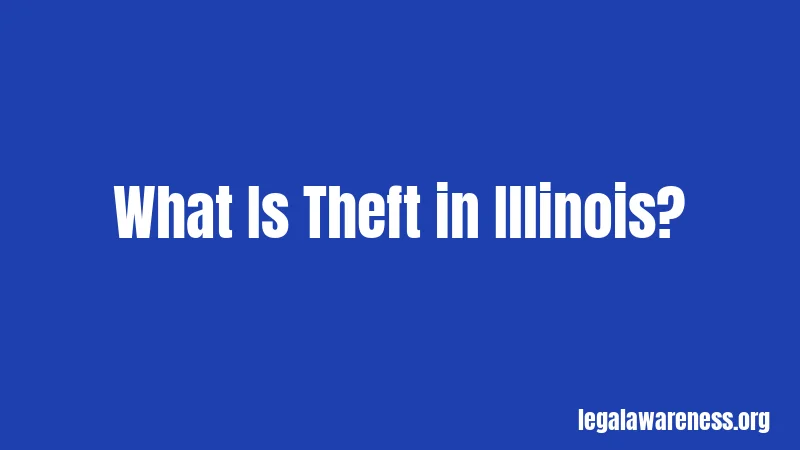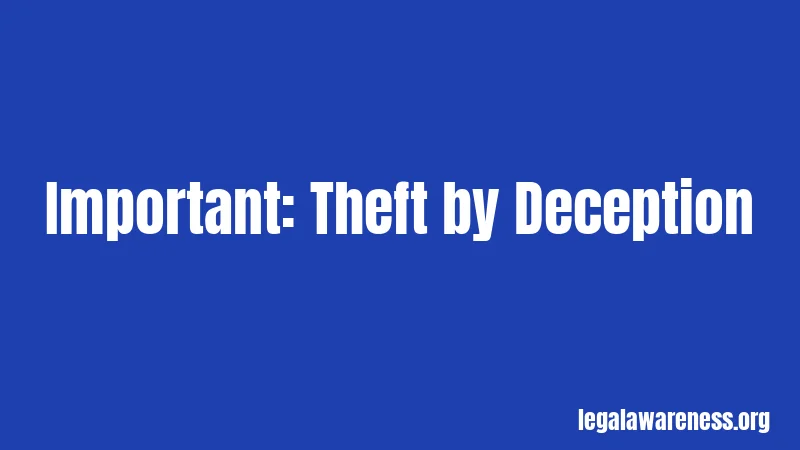Illinois Theft Laws (2026): Everything That Counts as Stealing
Most people think they know what theft is. Steal something that doesn’t belong to you, go to jail, right? Actually, Illinois theft laws are way more detailed than that. Honestly, this is the part most people miss.
In Illinois, theft covers a lot more than just shoplifting or grabbing a purse. The law can apply to services, property, and even things you might not realize. And the penalties? They get serious fast. Let’s break down exactly what you need to know.
What Is Theft in Illinois?

Theft in Illinois means taking something that belongs to someone else. You keep it with the intent to permanently deprive the owner of it. Sound straightforward? Here’s where it gets tricky.
The law covers way more than physical objects. You could face charges for stealing electricity. Services like labor, transportation, or professional work count too. Even intangible things like data or information can be theft under certain circumstances. Pretty straightforward once you understand the scope, right?
The key thing here is intent. You have to know the property isn’t yours. You have to want to keep it permanently. Accidentally taking someone’s umbrella from a rack? Probably not theft. But keeping it because you “forgot” to return it? That’s where the law gets involved.
Basic Theft Charges in Illinois
Simple Theft (Class B Misdemeanor)
Here’s where it gets interesting. If you steal something worth less than $500, you’re looking at a Class B misdemeanor. This is the most common theft charge.
Here’s what you’re facing: Up to six months in jail. Or a fine up to $1,500. Or both jail time and a fine together. This is the base level charge, but even this carries real consequences.
Wondering if this applies to you? If the stolen item’s value is under $500, Illinois treats it differently than larger amounts. The value is what the property was worth at the time you took it, not the original price tag.
Theft of Property Worth $500 to $1,000 (Class A Misdemeanor)
Now things start getting more serious. Steal something worth between $500 and $1,000, and you move up to a Class A misdemeanor.
Penalties here are steeper: Up to one year in county jail. A fine up to $2,500. Again, you could face both penalties at once. This one stings more than a simple misdemeanor.
Theft of Property Worth $1,000 to $10,000 (Class 3 Felony)
Okay, pause. This is where we cross into felony territory. Felonies are serious. They can follow you for life.
Steal something worth between $1,000 and $10,000, and now you’re facing a Class 3 felony. In Illinois, a Class 3 felony means two to five years in prison. Plus, you could be fined up to $10,000.
Theft of Property Worth $10,000 or More (Class 2 Felony)
A Class 2 felony is no joke. This applies to stolen property worth $10,000 or more.
You’re looking at three to seven years in prison. A fine up to $25,000. And here’s the thing: even if you don’t do time, a felony conviction changes your life. Jobs, housing, loans, and more all get affected.
Special Types of Theft

Retail Theft (Shoplifting)
Shoplifting gets its own special rules in Illinois, actually. Most people assume it’s treated the same as other theft. They find out different when they get charged.
Retail theft means knowingly taking merchandise from a store without paying. This includes intentionally bypassing security systems or removing price tags. It also includes taking property with intent to return it for a refund you didn’t pay for.
Wait, it gets better. Illinois has penalties just for retail theft that might differ from regular property theft. A first offense under $150 can result in up to 120 hours of community service. But if the store presses charges, you could still face the regular theft penalties based on property value.
Theft of an Identity
Identity theft is its own crime in Illinois. This is when you use someone’s personal information to commit fraud or obtain credit without permission.
You could be charged with identity theft if you take someone’s Social Security number, driver’s license number, credit card information, or financial account details. Then use it for financial gain.
Penalties are serious: A Class 2 felony if the victim loses over $300. That means three to seven years in prison plus up to $25,000 in fines. Even under $300 loss, it’s still a Class 3 felony with two to five years possible.
Theft of Utilities (Electricity, Gas, Water)
Taking electricity, gas, or water without paying counts as theft in Illinois. Seriously.
This covers tampering with meters. It covers bypassing payment systems. Even illegally accessing Wi-Fi or cable services can apply here. The penalties follow the same structure as regular theft based on value.
Theft of Trade Secrets
If you steal business secrets, formulas, designs, or proprietary information, you’re facing a Class 3 or Class 2 felony depending on severity.
This one’s important for employees especially. Taking plans or information to a competitor? That’s a felony. The value of those secrets determines the exact charge.
Receiving Stolen Property
Hold on, this part is important. You don’t have to steal something to face theft charges.
If you buy, receive, or accept stolen property knowing it’s stolen, you can face the same charges as the person who stole it. The prosecution has to prove you knew it was stolen. But even suspecting something’s stolen and ignoring it can look bad to a judge.
Penalties and Consequences
Let me break down exactly what happens when you get convicted of theft in Illinois.
Jail or Prison Time: This depends on the amount stolen, as we covered above. A misdemeanor means up to a year in county jail. A felony means years in state prison.
Financial Penalties: Fines range from $1,500 for a simple misdemeanor to $25,000 for a Class 2 felony. You pay this on top of any jail time.
Criminal Record: This sticks with you. Employers see it. Landlords see it. Anyone doing a background check sees it. In Illinois, you generally cannot get a felony conviction expunged from your record.
Restitution: You usually have to pay the victim back for what you stole. This happens even if you go to jail. The judge will order you to compensate the person or business you stole from.
Driver’s License Suspension: If you’re convicted of shoplifting, the Illinois Secretary of State might suspend your driver’s license for 12 months. This applies to first and second offenses. A third offense means a two-year suspension.
Employment Impact: Many employers won’t hire people with theft convictions. You’re essentially locked out of certain jobs and industries.
Housing Challenges: Landlords often reject applicants with theft convictions. Finding affordable housing becomes much harder.
Think of it like a traffic ticket, but with way more serious, long-term consequences. The immediate penalties are real. The long-term impact on your life is often even bigger.
Important: Theft by Deception

Illinois also covers theft by deception or fraud. This means obtaining someone’s property through false pretenses or lying.
You could face theft charges if you use someone’s property knowing they would refuse if they knew the truth. This includes writing bad checks. It includes using someone’s bank account info without permission. It includes making false statements to get a loan or credit.
The penalties are the same as regular theft based on the value obtained through the deception. A manager running a PayPal scam? Facing the same charges as someone shoplifting, potentially worse if the amount is higher.
How to Stay Out of Trouble
Here’s what you need to do: Don’t take anything that doesn’t belong to you. Yeah, that sounds obvious. But a lot of people rationalize taking things.
The office supplies? Still theft if not authorized. Your roommate’s food in the shared fridge? Technically theft if they didn’t say you could have it. Your ex’s belongings you’re “borrowing” without permission? That’s taking property without consent.
If you’re tempted, remember this: Illinois prosecutors take theft seriously. Police take theft reports seriously. Store security is actually trained to watch for this. Getting caught isn’t the only risk. The long-term consequences are what change your life.
Frequently Asked Questions
Can you get charged with theft if you planned to return the item?
Planning to return it doesn’t matter legally. The moment you take something with intent to keep it permanently, you’ve committed theft in the law’s eyes. Your intentions don’t erase the crime.
What if the store didn’t have a “no shoplifting” sign?
The sign doesn’t matter. You don’t need a posted sign to know that stealing is illegal. Illinois law doesn’t require stores to announce the obvious.
If I shoplift under $150, will I definitely get charged with a crime?
Not necessarily. Store managers have discretion. Some might ban you from the store instead. Some might call police. It depends on store policy and the circumstances. But relying on this is risky.
Can a theft charge be expunged from my record in Illinois?
Only misdemeanor theft convictions under specific circumstances. Felony convictions for theft cannot be expunged. This is permanent on your criminal record.
What’s the difference between theft and robbery in Illinois?
Theft is taking property without permission. Robbery is theft plus force, threat, or intimidation. If you steal something while threatening someone, that’s robbery. Robbery charges are more serious and carry longer prison sentences.
Final Thoughts
Illinois theft laws are strict, and they cover more than most people realize. Understand what counts as theft. Know the penalties. Stay away from situations where you might be tempted.
The consequences extend far beyond jail time and fines. A theft conviction affects your employment, housing, and reputation. It follows you for years. Is whatever you’re tempted to take really worth that?
Now you know the basics. Stay informed, stay smart, and when in doubt, just don’t take it. If you face actual charges, talk to a criminal defense attorney immediately. They can protect your rights and explore your options.
References
Illinois Criminal Code: Theft (720 ILCS 5/16-1)
Illinois Attorney General: Criminal Justice Resources
Illinois State Police Criminal Records Bureau
Cook County State’s Attorney Office: Criminal Charges Information
